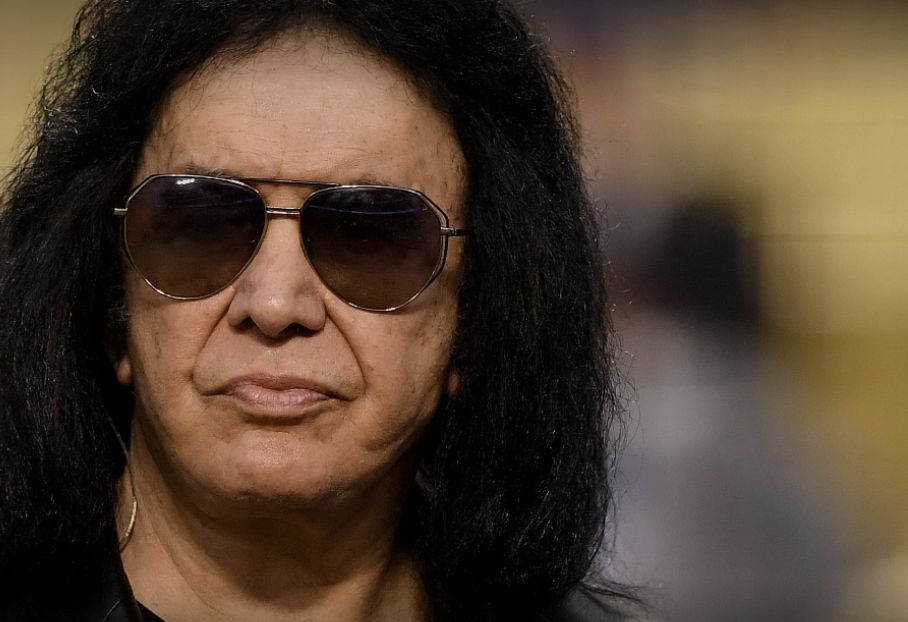
Gene Simmons Gets Real About KISS, and…Crypto Currency « American Songwriter
Talking with legendary rock ‘n’ roll musician, Gene Simmons, one thing becomes clear pretty quick—he likes a good thrill. Though he speaks measuredly, thoughtfully and with clear perspective, what he talks about is often that which excites him. As he puts it, life should be a roller coaster that does anything but go straight ahead. There needs to be swoops, dives, jolts and misdirection that get one’s heart pumping. Simmons, of course, is a master at that. His band, KISS, is the leader in the clubhouse when it comes to on-stage pyrotechnics. And the amount of face makeup the band has used over the years could likely paint a mansion or two. And Simmons, who has endeavored in seemingly countless successful areas of branding and business over the years, has recently partnered with the prominent guitar company, Gibson, to create the new G2 series of signature basses and six-strings.
American Songwriter caught up with the rocker to talk about his early days coming to America from Israel as an immigrant, what he loves about music, what he loves about comic books, his crypto currency investments and much more.
American Songwriter: When did music first enter your life as a young person?
Gene Simmons: I was probably nine years of age. I had just come to America. I couldn’t speak a word of English. This was in 1958. Maybe it was 1858—see what I did there? That was a joke. And the first music I heard was Chuck Berry. Ironically, I did the eulogy at Chuck’s funeral. I happen to be there and the family asked me to do the eulogy for Chuck Berry, which, obviously, is a great honor. But the first music I heard was, I guess, the founding fathers of rock. Chuck Berry, Little Richard, Fats Domino. All those African-Americans that made all of it work. Now, I wasn’t familiar with the blues. I’d never heard of Howling Wolf or T. Bone or any of those guys until much later on. The original guys I heard that impacted my life basically was Black music. And then after that, Jackie Wilson and, you know, all those guys. The white guys were okay and they appealed to the chicks and everything. But the real stuff was Black music. That made your bottom, your groin shake and move in ways that white music didn’t. Even Chubby Checker—I became a ‘Twist’ champion when he did the twist, which was originally recorded by Hank Ballard and the Midnighters. He covered it and sounded a lot like Hank Ballard. And then he had, ‘Let’s Twist Again,’ which also became a hit—number one. And I was the ‘Twist’ champion of my school. But also ‘The Twist’ was kind of pop Black music, but it made you shake your groin, your hips.
AS: There’s a long history in America, especially at the time that you came to the country, of Black Americans and Jewish Americans working closely together in places like New York City. Do you think about that at all when you remember the first music that impacted you here in the States?
GS: Well, the real secret that’s not widely talked about is that it was Jews—you know, originally, it was race music. Black music was not allowed to be heard on white radio. And it was really the Jews—[Jerry] Leiber and [Mike] Stoller, who wrote, ‘You ain’t nothin’ but a hound dog’ and ‘Give me fever in the morning,’ all that Black music. The Coasters and Ben E. King and all that, written by two Jews. Two Jews who couldn’t stand Broadway and that kind of schmaltzy music that the other Jews were doing. They loved Black music and they were responsible for a lot of the Black music that came out there. Elvis, Big Momma Thornton and all that. The truth is that if it wasn’t for Sam Phillips and a lot of the other guys, early rock ‘n’ roll, including Elvis, would have never happened. It was these Jews who owned the record companies that opened the doors to Black music. Sam Phillips recorded Bo Diddley and lots of other stuff while the rest of the record companies would never touch them.
AS: How did you decide to invest and double-down on music?
GS: I didn’t know anything. And that’s the magic of this thing called rock or rock and roll. I was minding my own business trying to figure out how to talk to chicks and not get too scared that I had hair growing out of my crotch—I was scared to death: ‘What is that? Am I going to get a beard down there? Oh my gosh!’ Because nobody ever talked about that stuff. And I remember being in sixth grade and not being able to stand up at the end of the class because I had a hard-on. And not understanding what was happening to my body, I was like, ‘What is that!’ I just walked around hunched over. All those funny adolescent things. And then I heard the Beatles. And I saw the Beatles on The Ed Sullivan Show in 1964. And I have to say, like a lot of musicians, a lot of guys and bands, it changed my life. All of a sudden it was okay to sound different and look different and not fit into society. And that’s how I felt, coming from Israel. I spoke with an accent, I didn’t look like anybody else. I was bigger than other people. I just felt like an outsider. And all of a sudden, these guys came who spoke with an accent, and so did I at that point. So, originally, in the beginning, I just sang. ‘There were bells, on a hill, but I never saw them.’ Trying to sound like McCartney and Lennon and all that. Even for a while at parties, I’d speak in an English accent like an idiot. ‘Where are you from?’ ‘I’m not from here, yeah, mate.’ ‘Oh really, you’re not from here? Oh you must be English!’ It took a while to figure out—you got to figure out what your own DNA is and to thine own self be true. And that didn’t happen until, oh I don’t know, high school or so when I started writing my own songs. And I noticed what was coming out, some of them, was sort of a gestalt between the Black music I’d heard and the Beatles pop that I heard in the British invasion.
AS: What did you love about comic books as a young person?
GS: You know, I couldn’t read or write English and when I first came to America, I turned on television and there was a guy flying through the air with a cape on. I didn’t know what—what is that! As far as our culture, we gave the world the Ten Commandments. Moses could split the sea and everything but the guy couldn’t fly through the air. By the way, it’s worth noting, that all the superheroes were created by Jews. Yes, they were. Yup—Superman, Batman, the Hulk, the Fantastic Four, Human Torch, Sub Mariner, Captain America—Jews created it. Jack Kirby? Not his real name. Jacob Kurtzberg. Stan Lee? Stanley Lieber. And Bob Cane was actually Kahn. Anyway, the point is that I started reading comic books, first of all, because it was easier to read because you didn’t have to read them. You could look at the pictures, which were much more exciting than books. And I also couldn’t read English. Comic books actually helped me understand the jargon, the commonly accepted form of the American language versus what was written in books. I could speak very, very little Japanese, fairly good German, fluent Hungarian and fluent Hebrew. But if you read literature, that’s not the way people speak. It’s not the way songs are sung. It’s a completely different nuance. So, comic books made me understand. Then when I heard rock, words like ‘you ain’t,’ which was considered vulgar, I heard how people actually spoke. The best teachers I had were rock ‘n’ roll and comic books.
AS: Do you remember the day when you first put on makeup?
GS: Yes, we were in a rat-infested firetrap, where we rehearsed, and trying to put together this band that we never saw on stage. And initially, we were called Wicked Lester. And we decided to change our name because Wicked Lester got a record contract. We were doing Doobie Brothers, Three Dog Night kind of music, three-part harmony, that kind of stuff. And we got a record deal with Epic but Paul [Stanley] and I just didn’t believe in it. So, we walked out of that deal and decided to go to step-one, which is, let’s just do what we believe in, which was—we were big Anglophiles. What the English did by taking American Black music and making it their own was what interested us. Clearly like the Beatles, but also the Stones and The Who and Humble Pie. You know, the greats. Zeppelin, of course. So, we decided to put together this band that we never saw on stage. But we also realized that everybody’s got long hair and tries to be androgynous and stuff. So, why don’t we do our own thing? And one day one of us, I can’t remember who, said let’s go down to Woolworths, which was a department store, and buy some—I don’t know, let’s go fool around and buy stuff. So, we went down there and bought mirrors and clown makeup. I remember it was $15. And we brought the stuff to our loft and without anybody else there, just the four of us started putting makeup on our faces. We had no idea what we were doing. The irony is, it’s pretty close to what we still wear today. Almost fifty years later.
AS: What is it about pyrotechnics that you love?
GS: I was always bored when I went to see the bands live. I got excited when Hendrix lit his guitar on fire. I got excited when Townsend smashed his guitars and when there was fog on stage, when The Who would destroy their amplifiers. Because it was performance art. And I don’t know where that stuff came from. We just went, why don’t we combine being a band and a Fourth of July fireworks show. Let’s stick everything in the show. So, we literally started drawing ideas without managers or anything and just decided what do. If I was a fan and went to see a band, what can we do to not just play songs—you know, the songs have to be good—but what else can we give them? An audio-visual treat. That’s where that came from. So, if you go to see Sir Paul McCartney or wrestling or Garth Brooks and you see fireworks there, where do you think they got that from? So, maybe our legacy is—they wrote a few good songs, that’s pretty good. Everybody writes a few good songs. But if we raised the expectations of fans, that’s good enough. If you see a KISS show, it’s not enough to see me, here I am with my legs crossed on a Persian carpet with incense on and I’m going to be playing an acoustic guitar and I’m going to charge you full price. Nope. No.
